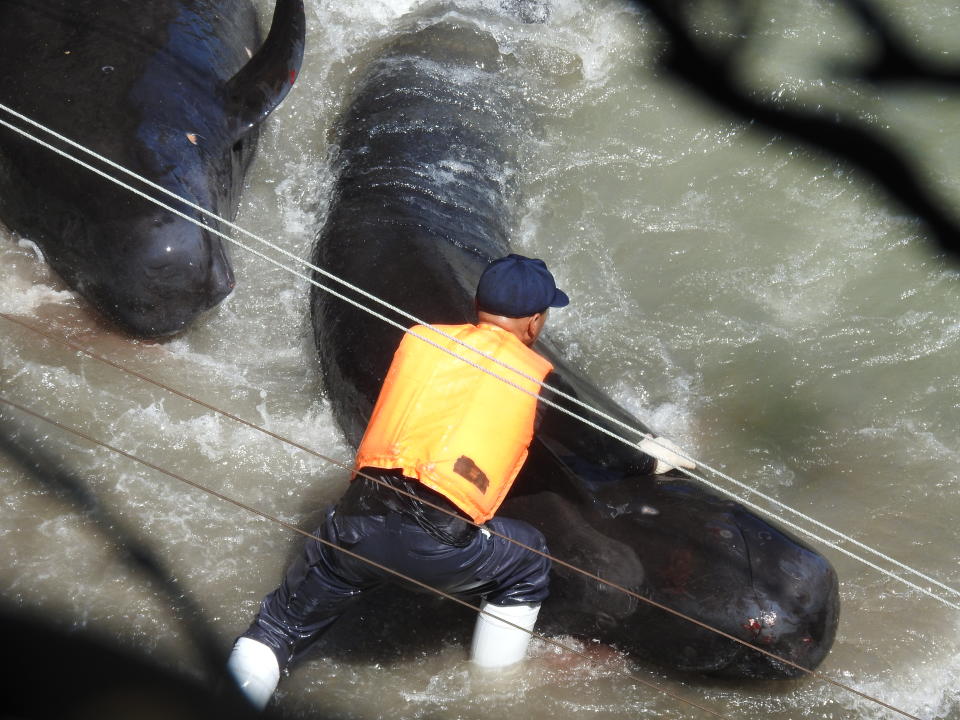'Heartbreaking' video shows calf isolated as hunters move in to slaughter whales
A veteran activist has opened up about his “heartbreaking” decision not to intervene as Japanese hunters slaughter dolphins and whales.
Tim Burns from Ric O’Barry’s Dolphin Project has been visiting the Japanese village of Taiji in Wakayama prefecture for 10 years, documenting the annual hunt.
This year has proved particularly tough on the activist.
On Monday, at about 7.20am the hunters began pursuing a large pod of pilot whales - estimated to be more than 50 individuals.
By 10.30am, the family group were exhausted and they tried to beach themselves in an attempt to escape their pursuers.
Mr Burns and his team watched from behind a camera as the whales crashed against the rocks and blood spilled.

“The hunters came in frantically with their skiffs, trying to use their motors, their engines to scare them back out into the deeper water and that just kind of split the whole pod into all directions,” Mr Burns told Yahoo News Australia.
“They were jumping up on rocks, they were getting caught in nets, they were under the skiffs, getting up on the beach - it was just pure chaos.”
Then something he calls truly “heartbreaking” caught his eye - a whale calf, barely able to swim, was separated from his mother.
“There’s one small juvenile individual that is off on the other side of the cove all by itself, barely able to keep its head up,” he said.
“I filmed him for quite a while just going in little, tiny, tight circles.
“Obviously his mother had perished and was no longer anywhere nearby - really sad.”
Sources advise the whale calf later died.


Watching the watchers
Mr Burns said that during the hunt he is followed by the Japanese police as well as local volunteers who watch his every move.
“I have three police cars with me when I drive through town,” he said.
“Up on the hill there’s multiple police officers, there are plain clothes police officers that are up there with video cameras, watching what I’m doing.
“Also the town of Taiji have representatives wearing arm bands that say Taiji - they’re up there, watching what I’m doing trying to catch me doing something wrong.
Overnight, the surviving whales where netted in a pen where Mr Burns said they would be slaughtered.
“It’s really, really tough to not physically intervene, to not get in and try to stop this,” Mr Burns said.
“If I did it would get no media attention in Japan, which is the main place where we need to get media attention.
“We have to follow the law, follow the rules, the guidelines that the police set out for us, and to be honest, if I tried to make a break for it I don’t think I’d get to the water before the police got to me.”

On Tuesday, Mr Burns returned to the edge of the cove to film as the water turned red.
“A lot of blood starting to spill in,” he said as the hunters got to work.
'Dirty secrets' of dolphin tourist parks revealed as 'abuse' video emerges
'Alarming' photographs show 'sewage' spilling into dolphin pens
Dolphin parks buying wild animals from Taiji
Every year, fishermen in Taiji capture dolphins and whales for the lucrative aquarium market and slaughter others for their meat.
This year the drive quota is 1749, which includes 298 bottlenose dolphins and 200 melon-headed whales.
In week three of the dolphin drive, hunters killed 21 and took 16 for the aquarium industry - none were released.
Japan has over 70 dolphinariums and China is expected to overtake that number next year - dolphins are needed to fill the tanks.
Mr Burns urges people upset by the slaughter and capture of dolphins and whales not to attend dolphinariums.
Do you have a story tip? Email: newsroomau@yahoonews.com.
You can also follow us on Facebook and Twitter, download the Yahoo News app from the App Store or Google Play and stay up to date with the latest news with Yahoo’s daily newsletter. Sign up here.



